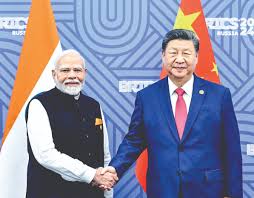Reading the Thaw (GS Paper 2, IR)

Introduction
- The recent thaw in relations between India and China is being seen as a positive development for both regional and global peace and stability.
- This shift has elicited diverse reactions, with both hawkish and dovish perspectives emerging on the evolving dynamics.
- India's foreign policy, underpinned by realism and pragmatism, continues to shape its approach toward China, balancing challenges with opportunities in a manner that seeks stability and cooperation.
Three Important Meetings Between India and China
Recent Bilateral Meetings:
- Kazakhstan, October (BRICS Summit): Prime Minister Narendra Modi met with Chinese President Xi Jinping, marking a significant engagement after a period of strained relations.
- Brazil, G20 Summit: Indian Foreign Minister S. Jaishankar met Chinese Foreign Minister Wang Yi, further enhancing dialogue between the two countries.
- Laos: Indian Defence Minister Rajnath Singh met with Chinese Defence Minister Admiral Dong Jun, discussing military cooperation and regional security.
Historical Context:
- The meeting between Modi and Xi in Kazakhstan occurred five years after their last summit in 2019 in Mahabalipuram, Tamil Nadu.
- Relations had soured after China’s violations of the Line of Actual Control (LAC) in 2020, leading to casualties on both sides.
- Following these developments, interactions between Modi and Xi were limited, with minimal engagement at the 2022 Bali G20 Summit and the 2023 Johannesburg BRICS Summit.
Recent Enthusiasm in Bilateral Engagements
Positive Statements:
- China’s Position: China has referred to India and China as “important members of the Global South,” underscoring their shared responsibilities in global governance and regional peace.
- India’s Position: India, for its part, emphasized the need for "stable, predictable, and amicable bilateral relations" as crucial for peace in the region.
Collaborative Efforts:
- During their respective meetings, Indian Defence Minister Rajnath Singh and Chinese Defence Minister Dong Jun noted productive discussions that suggest a potential for better cooperation.
- Foreign Minister S. Jaishankar praised the collaborative environment within the BRICS, Shanghai Cooperation Organization (SCO), and G20 frameworks, highlighting India's commitment to multilateral engagement with China.
Varied Perspectives on India-China Relations
Optimistic Views:
- Global Times has shown signs of optimism, noting that the improving relations are encouraging. Some analysts attribute India’s engagement with China to its economic needs, while others suggest that China may be seeking to exploit India’s tensions with the West to its advantage.
Strategic Analysts:
- Hawks: There are those who remain highly skeptical of China's intentions, viewing any rapprochement as unlikely and advising India to restrict its relations with China. They argue that India should strengthen its ties with the West to counter China’s growing influence.
- Doves: On the other hand, advocates for cooperation despite challenges argue that diplomacy with China could open avenues for mutual benefit. However, this view has lost some ground since the violent Galwan clash of 2020, which hardened Indian perceptions of China’s intentions.
India’s Realist and Pragmatic China Policy
Balanced Approach:
- India’s strategy toward China reflects a pragmatic approach that acknowledges both the points of convergence and divergence between the two nations.
- While recognizing China's history of LAC violations, India remains committed to dialogue and peaceful resolutions, particularly as both nations navigate global power shifts.
Key Statements:
- PM Modi has emphasized the importance of "handling differences and disputes" to ensure stable bilateral relations.
- S. Jaishankar has consistently advocated for “mutual sensitivity, respect, and interest” in dealing with China.
China’s Stance:
- China has critiqued India’s attempts at “decoupling” from China as counterproductive, asserting that the future of relations hinges on India’s “sincerity” in maintaining stable ties.
India’s Response:
- India, however, maintains its firm stance of an independent foreign policy, stating that its relations with any country, including China, are not viewed through the lens of third-party interests.
- India stresses the importance of principled, consistent policies that reject unilateral dominance.
Conclusion: India’s Multipolar Vision
- Prime Minister Modi has conveyed a strong message that India is committed not only to a multipolar world but also to a “multipolar Asia.”
- This vision calls for more equitable global governance and underscores India's desire for balanced and sovereign relations with its neighbors, including China.
- While some view this shift as a “new beginning” in India-China relations, India’s goal is to foster a “new understanding” with China, addressing both long-standing challenges and emerging opportunities.


